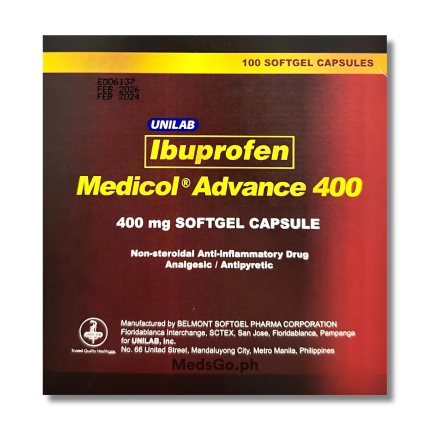All variations
Indications / Uses
MEDICOL ADVANCE 400 Ibuprofen 400mg is used for the relief of various types of pain and inflammation, including headaches, migraines, toothaches, and menstrual pain (dysmenorrhea). It is also effective for relieving muscular aches such as sprains, strains, and backache, as well as minor aches associated with the common cold and flu symptoms. As a non-steroidal anti-inflammatory drug (NSAID), it works by altering the body's response to pain, inflammation, and high temperature. It also provides relief for fever reduction.
Formulation / Ingredients
MEDICOL ADVANCE 400 Ibuprofen 400mg contains: Ibuprofen 400mg
Do I need prescription to buy MEDICOL ADVANCE 400 Ibuprofen 400mg?
No prescription required to purchase MEDICOL ADVANCE 400 Ibuprofen 400mg. You can order it right now on our website.
Side Effects
MEDICOL ADVANCE 400 Ibuprofen 400mg common side effects include: gastrointestinal disturbances such as stomach pain, heartburn, and nausea, which are typically reduced when taken with food. Other common effects may involve lightheadedness, headache, and skin rashes. Prolonged use or high doses can rarely increase the risk of serious gastrointestinal complications, including ulceration or bleeding. Individuals with existing stomach issues should exercise caution.
Directions and Dosage
- Adults and Kids (12+ years): Take 1 softgel capsule as needed.
- Dosing should be spaced by at least 4 hours between each capsule.
Do not exceed 3 capsules (1,200 mg) in 24 hours. This product is intended only for short-term use, generally not exceeding 10 days.
Contraindications
Do not use in individuals with known allergy to the active substance, aspirin, or other similar pain relievers. Avoid if there is a history of stomach ulceration, gastrointestinal bleeding, or perforation. It is also not suitable for those with severe heart, kidney, or liver failure.
Use in Pregnancy and Lactation
Avoid taking this product during the last 3 months of pregnancy as it may harm the developing baby. Use in earlier stages should be limited to the lowest effective intake for the shortest possible duration.
Special Precautions
- Use the lowest effective intake for the shortest duration necessary to control symptoms.
- Exercise caution in individuals with a history of hypertension, heart failure, or fluid retention.
- Avoid concurrent use with other anti-inflammatory drugs or aspirin, particularly at higher doses.
Is it safe to take it with other medications?
Taking this product with other blood thinners or certain antidepressants can increase the risk of stomach bleeding. It may also reduce the effect of some high blood pressure medications and can increase the concentration of lithium in the body.
How should I store it?
Store the softgel capsules at a temperature not exceeding 30°C. Keep the product away from moisture, heat, and direct light to protect the contents.
Used For
- Pain, Inflammation, Fever
Age
- 12 years & up
Features
- Ibuprofen
Reviews
No reviews found
Product Questions



